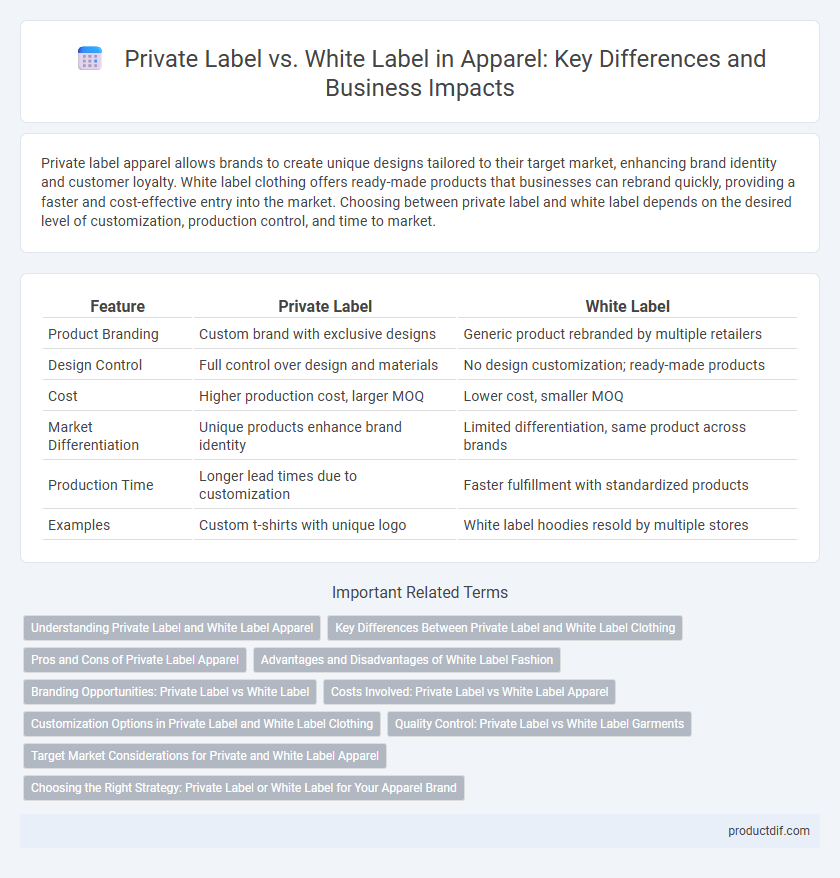Private label apparel allows brands to create unique designs tailored to their target market, enhancing brand identity and customer loyalty. White label clothing offers ready-made products that businesses can rebrand quickly, providing a faster and cost-effective entry into the market. Choosing between private label and white label depends on the desired level of customization, production control, and time to market.
Table of Comparison
| Feature | Private Label | White Label |
|---|---|---|
| Product Branding | Custom brand with exclusive designs | Generic product rebranded by multiple retailers |
| Design Control | Full control over design and materials | No design customization; ready-made products |
| Cost | Higher production cost, larger MOQ | Lower cost, smaller MOQ |
| Market Differentiation | Unique products enhance brand identity | Limited differentiation, same product across brands |
| Production Time | Longer lead times due to customization | Faster fulfillment with standardized products |
| Examples | Custom t-shirts with unique logo | White label hoodies resold by multiple stores |
Understanding Private Label and White Label Apparel
Private label apparel refers to clothing products designed and branded exclusively by a retailer or company, allowing control over product specifications and branding. White label apparel consists of pre-manufactured garments produced by third-party manufacturers, which multiple retailers can brand and sell under their own names with little to no customization. Understanding the distinctions between private and white label apparel is crucial for businesses aiming to balance uniqueness, production control, and cost-efficiency in their inventory strategy.
Key Differences Between Private Label and White Label Clothing
Private label clothing is manufactured by a third party but sold under a retailer's exclusive brand, allowing for unique designs and greater control over product specifications. White label clothing involves generic products made by a manufacturer that multiple retailers can rebrand and sell as their own, offering limited customization options. The key difference lies in the level of customization and exclusivity, with private label emphasizing brand identity and white label focusing on convenience and faster market entry.
Pros and Cons of Private Label Apparel
Private label apparel offers brands complete control over design, quality, and branding, allowing for unique product differentiation and higher profit margins. However, it requires significant investment in product development, inventory management, and marketing efforts compared to white label options. The challenge of longer lead times and risks associated with unsold stock can impact cash flow and operational efficiency for private label apparel businesses.
Advantages and Disadvantages of White Label Fashion
White label fashion allows retailers to quickly launch branded apparel without product development, reducing time-to-market and upfront costs. However, the lack of exclusivity can lead to market saturation as multiple retailers use identical products, limiting brand differentiation. Dependence on manufacturers for quality control and limited customization options are other notable disadvantages.
Branding Opportunities: Private Label vs White Label
Private label apparel offers exclusive branding opportunities by allowing retailers to design, customize, and control the product line under their own brand identity, fostering customer loyalty and market differentiation. White label products provide quicker market entry with pre-made designs that retailers can rebrand, but offer limited uniqueness and lower control over brand storytelling. Choosing private label enhances long-term brand equity through tailored quality and design, while white label supports cost-effective expansion with minimal operational involvement.
Costs Involved: Private Label vs White Label Apparel
Private label apparel typically involves higher costs due to custom design, branding, and manufacturing processes tailored to a specific business, including expenses for design development, minimum order quantities, and packaging. White label apparel usually incurs lower upfront costs because products are pre-designed and mass-produced by manufacturers, allowing retailers to rebrand and sell without investing in customization or design services. Understanding cost differences helps businesses balance initial investment against brand differentiation and control over the apparel line.
Customization Options in Private Label and White Label Clothing
Private label clothing offers extensive customization options, allowing brands to design unique styles, select fabrics, and control branding elements such as labels and tags, resulting in a tailored product reflecting their identity. White label apparel, by contrast, involves pre-designed garments with minimal customization, primarily limited to branding and packaging, enabling quicker market entry but less uniqueness. This distinction makes private label ideal for businesses seeking exclusive, brand-specific apparel, while white label suits those prioritizing speed and simplicity over customization.
Quality Control: Private Label vs White Label Garments
Private label garments offer brands greater control over quality standards, enabling customization from fabric selection to manufacturing processes, which ensures consistent product excellence. White label garments, often pre-made and mass-produced by third parties, provide less opportunity for stringent quality oversight, potentially leading to variability in material and craftsmanship. Brands seeking superior quality management typically prefer private label solutions to maintain their reputation and meet specific customer expectations.
Target Market Considerations for Private and White Label Apparel
Target market considerations for private label apparel focus on customization and brand identity, appealing to niche segments seeking exclusive or unique products that align closely with their values and preferences. White label apparel targets broader markets by offering generic, ready-made products that retailers can brand quickly to meet high demand with minimal differentiation. Understanding customer demographics, buying behavior, and brand loyalty is crucial for selecting between private label's personalized approach and white label's scalable convenience.
Choosing the Right Strategy: Private Label or White Label for Your Apparel Brand
Selecting the right strategy for your apparel brand hinges on understanding the key differences between private label and white label products. Private label involves customizing and branding products made by a manufacturer exclusively for your brand, offering greater control over design and quality, which can enhance brand identity. White label products are pre-made, generic items that multiple companies can sell under their own brand name, providing quicker market entry but less differentiation from competitors.
Private label vs white label Infographic

 productdif.com
productdif.com